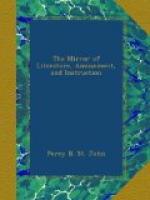W.G.C.
* * * * *
POOR LAWS
Before the Reformation there were no Poor Rates; the charitable dole given at the Religious Houses, and church-ale in every parish did the business. In every parish there was a church house, to which belonged spits, pots, crocks, &c. for dressing provision. Here the housekeepers met and were merry, and gave their charity. The young people met there too, and had dancing and bowling, shooting at butts, &c. A. Wood says there were few or no alms-houses before Henry VIII. In every church and large inn was a poor man’s box.—From Aubrey’s MSS. Collections.
It should be recollected that the present mode of assessment for the relief of the poor in England, was not adopted till every other mode had been tried. Before the dissolution of the religious houses, temp. Henry VIII., paupers were licensed to beg within certain limits (22nd. Henry VIII., chap. 12.) and magistrates were authorized to receive and support them, coming to the places of their birth, by voluntary and charitable alms, and a method was prescribed for collecting those alms. In the reign of Edward VI., laws were passed for enforcing charitable voluntary contributions (5th and 6th Edw. VI., chap. 2.) Persons refusing to give according to their means were to be admonished; first by the minister, and then by the bishop. These provisions were found insufficient, and it was enacted early in the reign of Elizabeth, that if the parties were insensible to the clerical and episcopal admonitions, they should be bound over by the minister or bishop to the quarter sessions; where they were again to be admonished; and if they remained refractory, the justices and churchwardens were to assess them according to their discretion. (5th Eliz. chap. 3.) In the 14th year of her reign the act was passed and provision made for regular assessments, and the appointment of overseers provided for; which the subsequent acts of the 18th, 39th, and 43rd of the same reign completed, and which has still remained.
ERNLE CRASHAW.
Near Weymouth.
* * * * *
THE NATURALIST.
* * * * *
ANIMAL INSTINCT: ANECDOTE OF A TAME SNAKE.
(To the Editor.)
The following remarkable circumstance clearly proves how foreign to children, is the fear or even the idea of danger; and, at the same time, it presents to the contemplative mind a striking instance of the wisdom which the Almighty has displayed in the works of the creation! In what a wonderful manner has he endowed all his creatures with sensibility, regulated their habits, and provided for their wants; and so ingeniously are the animal and vegetable kingdoms arranged, that the former is, in a great measure, dependent on the latter for nourishment and support.




